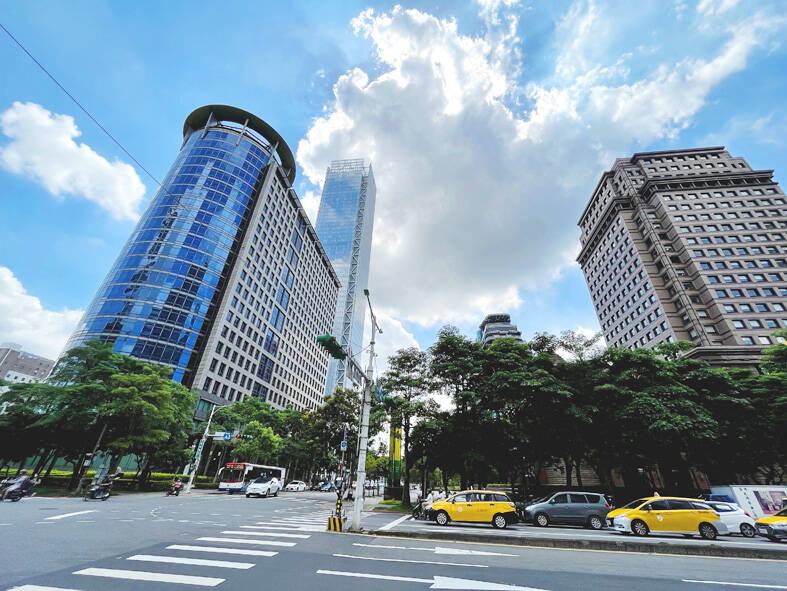Monthly retail rates for Taipei’s grade-A offices last year increased by 3.2 percent to NT$t2,975 per ping (3.3m2), driven by strong demand, but limited supply despite the lingering COVID-19 pandemic, real-estate agency Jones Lang LaSalle Taiwan Ltd (JLL Taiwan, 仲量聯行) said last week.
Monthly rent exceeded NT$4,000 per ping for most upscale offices in the city’s Xinyi District (信義) and could climb higher this year when new office spaces join the market, the company said.
The data showed that enterprises still have solid demand for high-quality office spaces, it said.

Photo: Hsu Yi-ping, Taipei Times
However, it remains to be seen if landlords would continue to have the upper hand, as interest rate hikes by domestic and foreign central banks slow economic growth and turn companies cautious on leasing decisions, JLL Taiwan said.
Office vacancy rates in Taipei averaged 2.6 percent last year, below 3 percent for four years in a row, the agency said, adding that the city’s figure compared with 7 percent in the Asia-Pacific region and 14 percent globally.
The local market showed the vacancy rate was more than 2 percent lower in Xinyi District — where potential tenants had difficulty finding office spaces due to a lack of supply — than other districts last year, JLL Taiwan said.
The Taipei market could see the entry of 45,000 ping of grade-A offices this year, mainly in Xinyi District, JLL Taiwan senior market director Brian Liu (劉建宇) told a news conference on Thursday last week.
The new office spaces would inject vitality into the market and ease the supply crunch, Liu said.
Second-tier areas such as Nangang District (南港) could become the next bright spot with 48,000 ping of new offices to become available over the next few years, due to the city government’s effort to build a new industrial cluster there, he said.
Environmentally-friendly and newly-built office spaces would gain popularity as companies assign increased importance to net zero carbon emissions, JLL Taiwan said.
Old office buildings could be forced out of the market unless they meet sustainability requirements through the urban renewal process, the company said.
On the other hand, inflation, monetary tightening and other economic headwinds would constrain leasing demand, it said.
The Financial Supervisory Commission last month raised the required minimum yield on property investments to 2.72 percent for life insurers, after the central bank adopted several interest rate hikes last year.
If interest rate hikes continue this year, the required minimum yield could exceed 3 percent by the end of this year, JLL Taiwan investment manager Sherry Wu (吳瑤華) said.
Investable properties would likely become scarce for life insurers and could affect the industry’s overall investment, she added.
The life insurance industry struggles to find investable property targets in Taipei and New Taipei City due to the relatively higher home prices in those areas, Wu said.
However, some commercial offices and leaseback factories in southern Hsinchu still support a yield of more than 3 percent, she added.

PERSISTENT RUMORS: Nvidia’s CEO said the firm is not in talks to sell AI chips to China, but he would welcome a change in US policy barring the activity Nvidia Corp CEO Jensen Huang (黃仁勳) said his company is not in discussions to sell its Blackwell artificial intelligence (AI) chips to Chinese firms, waving off speculation it is trying to engineer a return to the world’s largest semiconductor market. Huang, who arrived in Taiwan yesterday ahead of meetings with longtime partner Taiwan Semiconductor Manufacturing Co (TSMC, 台積電), took the opportunity to clarify recent comments about the US-China AI race. The Nvidia head caused a stir in an interview this week with the Financial Times, in which he was quoted as saying “China will win” the AI race. Huang yesterday said

Nissan Motor Co has agreed to sell its global headquarters in Yokohama for ¥97 billion (US$630 million) to a group sponsored by Taiwanese autoparts maker Minth Group (敏實集團), as the struggling automaker seeks to shore up its financial position. The acquisition is led by a special purchase company managed by KJR Management Ltd, a Japanese real-estate unit of private equity giant KKR & Co, people familiar with the matter said. KJR said it would act as asset manager together with Mizuho Real Estate Management Co. Nissan is undergoing a broad cost-cutting campaign by eliminating jobs and shuttering plants as it grapples

The Chinese government has issued guidance requiring new data center projects that have received any state funds to only use domestically made artificial intelligence (AI) chips, two sources familiar with the matter told Reuters. In recent weeks, Chinese regulatory authorities have ordered such data centers that are less than 30 percent complete to remove all installed foreign chips, or cancel plans to purchase them, while projects in a more advanced stage would be decided on a case-by-case basis, the sources said. The move could represent one of China’s most aggressive steps yet to eliminate foreign technology from its critical infrastructure amid a

MORE WEIGHT: The national weighting was raised in one index while holding steady in two others, while several companies rose or fell in prominence MSCI Inc, a global index provider, has raised Taiwan’s weighting in one of its major indices and left the country’s weighting unchanged in two other indices after a regular index review. In a statement released on Thursday, MSCI said it has upgraded Taiwan’s weighting in the MSCI All-Country World Index by 0.02 percentage points to 2.25 percent, while maintaining the weighting in the MSCI Emerging Markets Index, the most closely watched by foreign institutional investors, at 20.46 percent. Additionally, the index provider has left Taiwan’s weighting in the MSCI All-Country Asia ex-Japan Index unchanged at 23.15 percent. The latest index adjustments are to